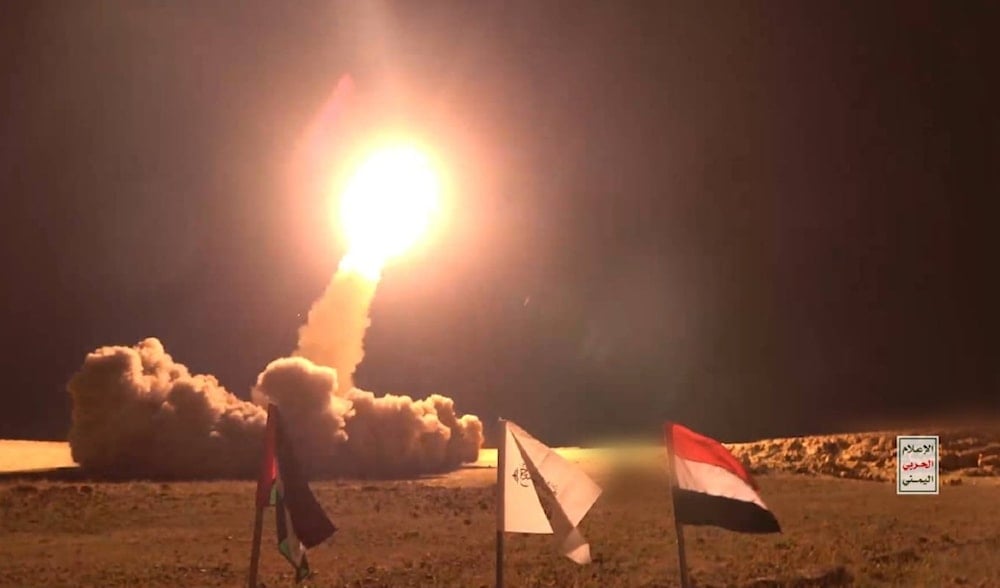'Yemen is not an ordinary enemy': Israeli media
Israeli media discusses the failure of the Israeli security and military establishment in confronting Yemen and its continuous attacks on Tel Aviv.
-

Scenes from the launch of Yemen's Palestine-2 hypersonic ballistic missile toward Tel Aviv, occupied Palestine on December 19, 2024. (Yemeni Military Media)
Yemen's rockets that struck "Israel" on Saturday have cast a shadow over Tel Aviv and its security establishments, Israeli newspaper Maariv stated on Monday, relaying the occupation's military and security apparatus' growing concerns regarding Yemeni threats.
According to Maariv, the military and security establishment has acknowledged that the Yemeni conundrum is highly complicated, saying "Yemen is not an ordinary enemy."
Among the complications in confronting Ansar Allah and the Yemeni Armed Forces are the thousands of kilometers that separate "Israel" and Yemen, the newspaper stated, adding that Yemen's Armed Forces are dispersed across the country and are present in areas not defined on the map.
Moreover, it is challenging to defeat Yemen, Maariv further added, noting that Saudi Arabia had previously waged this war and was not able to achieve any victory, nor was it able to break its will.
According to a security source, Yemen is a challenge "Israel" has not faced before, and it did not know how to deal with it.
Amid the growing Yemeni threats, the necessity to end the war on Gaza, and the subsequent field implications, calls renewed in Tel Aviv to reopen shelters for settlers to rush to in case of alarm triggers in anticipation of more missile attacks from Yemen, the Israeli Broadcasting Authority reported.
Moreover, over the past few hours, Israeli media thoroughly examined the difficulties in confronting Yemen, which mainly stem from Yemen's military capabilities and the failure of the Israeli security establishment to intercept ballistic missiles.
Therefore, "Israel" views it as difficult to defeat Yemen and believes there is a need to cooperate with the United States, according to i24NEWS.
US directs aggression against Yemen
The site revealed an Israeli plan to confront Yemen, encompassing four main areas: Targeting leadership, destroying the weapons production system, damaging the supply chain, and harming Yemen's national infrastructure.
On the other hand, Washington has recently decided, according to the i24NEWS, to change the course of operations against Yemen and increase military attacks. This decision was reportedly made by the Biden administration in coordination with the occupation after the former concluded that things had not progressed as expected following a year of conducting calculated attacks.
The Israeli website indicated that the recent attack on Yemen was part of this decision.
Earlier on Thursday, a series of intense Israeli airstrikes targeted the Yemeni capital, Sanaa, and the city of Hodeidah in western Yemen, Al Mayadeen’s correspondent reported.
According to our correspondent, approximately six Israeli airstrikes hit the Hodeidah port and the Ras Issa oil facility in western Yemen, resulting in the killing of nine people and injuries to several others among the facility’s staff.
He further noted that Israeli strikes targeted the central Dahban power station in northern Sanaa. Later, he indicated that Civil Defense teams successfully extinguished the fire at the Dahban station, while efforts continued to put out a blaze at another facility.
An Israeli reserve major, one of the pilots who participated in the air strike on Yemen, said that the mission "was very complex."
The Israeli officer explained that "the strikes covered a distance of approximately two thousand kilometers, with over sixty bombs dropped during the night. The precision of the raids was crucial," adding that "the pilots remained in the aircraft for six hours, from takeoff to landing."
Read more: YAF struck Israeli Security Ministry in support of Gaza: Al-Houthi

 4 Min Read
4 Min Read










